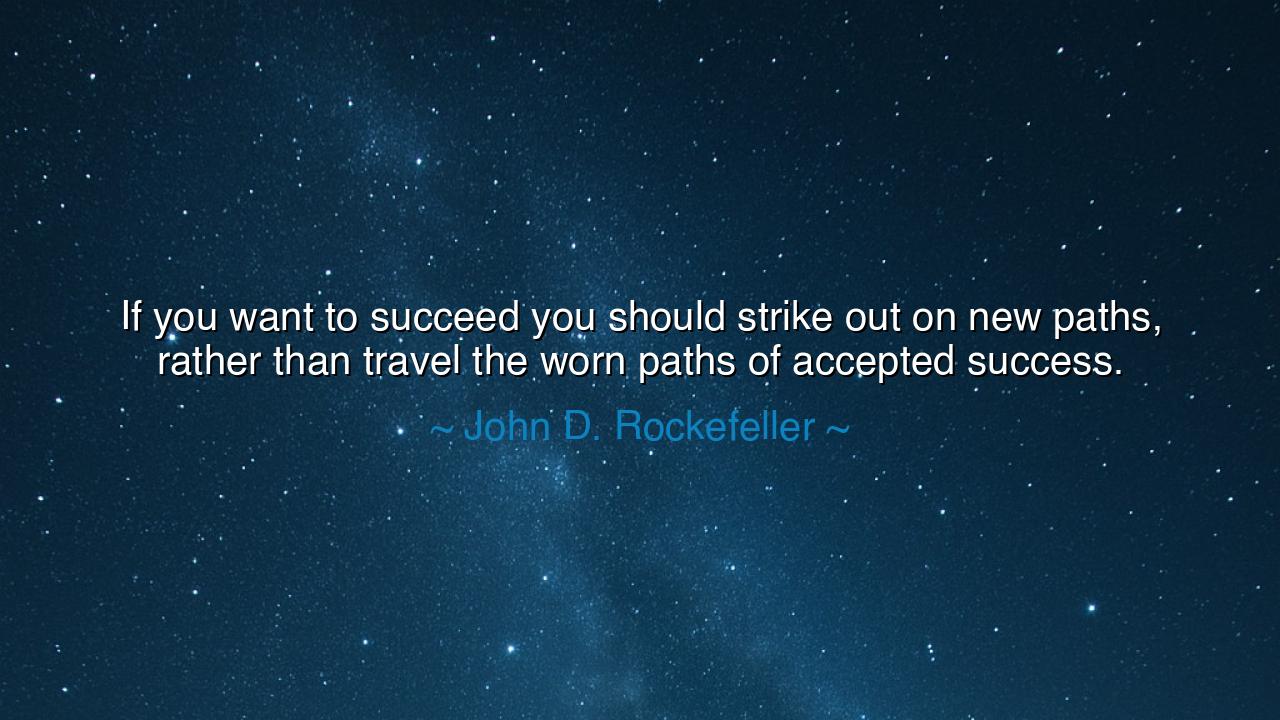
If you want to succeed you should strike out on new paths, rather
If you want to succeed you should strike out on new paths, rather than travel the worn paths of accepted success.






Hear, O traveler upon the road of ambition, the commanding words of John D. Rockefeller, titan of commerce and builder of empires: “If you want to succeed you should strike out on new paths, rather than travel the worn paths of accepted success.” This is no gentle observation, but a challenge to the soul. For many walk the roads already laid by others, seeking safety in footsteps well trodden. But the crown of greatness belongs not to those who follow, but to those who dare to cut a path through the wilderness, guided only by vision and resolve.
To strike out on new paths is to embrace uncertainty. It is to leave behind the comfort of imitation and to risk failure in pursuit of discovery. The worn paths of accepted success may bring modest security, but they also bind the soul within the limits of what has already been achieved. Rockefeller, who rose from humble beginnings to dominate the vast oil industry, knew this truth. He saw that true success lies not in copying the past, but in creating the future. His fortune was not built upon another’s map, but upon his own uncharted vision.
Consider the life of Christopher Columbus. The world believed the seas beyond the horizon to be perilous, an edge where ships might fall into nothingness. Many chose the worn path: trade along the Mediterranean, commerce across familiar waters. But Columbus, daring to strike out on a new path, sailed westward into the unknown. He stumbled not upon Asia, but upon a New World. His voyage, though flawed and filled with trial, reshaped history forever. The lesson endures: it is the risk-takers, not the imitators, who transform the world.
So too in the realm of invention. The Wright brothers, bicycle makers in a modest shop, did not walk the worn paths of accepted science. Scholars and engineers mocked the dream of human flight. Yet they refused to walk where others had walked, choosing instead to labor in obscurity, testing wings upon winds. At last, in 1903, their fragile machine lifted from the earth, and mankind entered the skies. Their story is proof of Rockefeller’s wisdom: true success is born of new paths.
The meaning is clear: safety may preserve, but only boldness creates. To follow the paths of others may lead to mediocrity, but to cut one’s own trail is to carve a destiny. The world remembers not those who followed faithfully, but those who dared differently—poets who broke old forms, leaders who challenged old powers, thinkers who asked forbidden questions. The path of originality is narrow and steep, but it alone leads to the peaks of greatness.
O listener, take this teaching to heart. Look around you: the well-trodden paths are crowded, their fruits already gathered. If you would gather your own, step away from the throng. Seek where others have not sought, attempt what others have feared, imagine what others have dismissed. In your work, your art, your daily life—ask not, “What have others done?” but, “What has not yet been done?” For it is in that question that your greatness lies hidden.
Therefore let this be your charge: strike out on new paths. Do not fear the solitude of the untraveled road, for it is there that the treasures of destiny are buried. Walk with courage, endure the doubts of others, and trust the light of your own vision. And when you arrive at the place no one else has reached, the world will look upon you not as a follower, but as a founder.
Thus Rockefeller’s teaching resounds through the ages: “If you want to succeed you should strike out on new paths, rather than travel the worn paths of accepted success.” Follow not merely the footsteps of the past—create footsteps for the future. In this lies the essence of true greatness, the mark of the pioneer, and the legacy of those who dared to walk where none had walked before.






AAdministratorAdministrator
Welcome, honored guests. Please leave a comment, we will respond soon